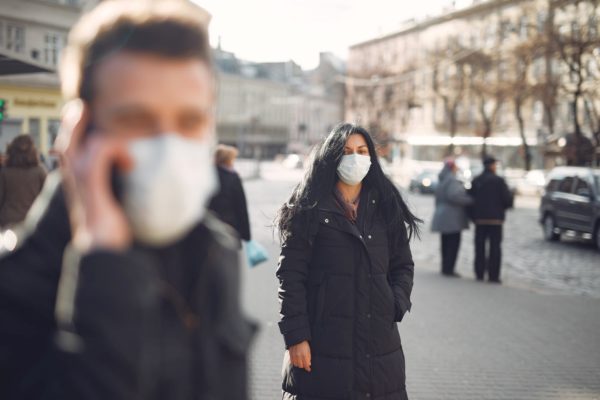If you’re reading this, it’s likely that the COVID-19 outbreak has changed your life in some way. If you’re lucky, it’s only changed the way you work. You may be learning the potential pitfalls that come with working from home, and how to stay productive when working from home. You’ll likely have to start learning the importance of budgeting as your employer reduces your pay. You may be learning new ways to occupy your time and your mind because your employer has placed you on furlough. Or you may be one of the unfortunates who has been let go from work completely.

Image by Burst via Pexels
Those significantly less lucky, however, may have already lost loved ones to the virus, or be separated while under lockdown from vulnerable relatives and loved ones who may always be on your mind. You may even have come into contact with the virus yourself and come out on the other side wondering if you can become reinfected (theoretically possible but unlikely). Whatever your personal experience with the pandemic has been thus far, one thing’s for sure… we’re far from being out of the woods yet.
In all probability, we face further weeks or even months of lockdown across the world until the curve is flattened and we make a gradual return to normality. In order to maintain our positivity, health and mental wellbeing, it’s important to keep a handful of important things in mind as we navigate this pandemic together…
The lockdown is finite
For many of us, lockdown has become the new normal. The human mind and spirit have a remarkable capacity to adapt. As such, some of us have already started to accept empty grocery store shelves, abandoned streets and a growing sense of social isolation as the status quo.
However, there’s a difference between adapting with aplomb and not being able to see the light at the end of the tunnel. With many governments remaining tight lipped about how long the lockdown will last, it’s easy to forget that indefinite is not the same as infinite. Social distancing has proven effective in flattening the infection curve and restrictions have already been lifted or at least loosened in some countries. There’s even hope that a vaccine could be ready as early as September 2020. We’d all feel a lot better knowing that there could be a viable vaccine in every vaccine fridge in every hospital and medical centre in the world before autumn draws to a close. If we all pull together and do our part now, we can ensure a brighter tomorrow for all.
Reach out to friends and family. They may need you now more than ever
It’s all too easy to forget this… but social distancing doesn’t mean social isolation. You may be unable to get within hugging range of your friends and family. However, that doesn’t mean that you can’t connect with them in meaningful ways. In this wonderful, digitally enabled world we live in it’s easier than ever to remain connected to the family and friends who mean so much to us.
In an era where digital technology has given us access to such a huge range of movies, tv shows, games, albums and books to keep us occupied, we can forget the value of human interaction. Even if it’s through digital means.
Why not call a close friend tonight? Or invite your former university room mate to Facetime with you? Liking and commenting on their social media posts is all well and good. But it’s really no substitute for a good old fashioned natter. Not only could it be a tonic for your mental health and wellbeing, you’ve no idea how much they may need it. They may have only recently got over a nasty bout of the virus, or even lost a loved one to it recently. They might have lost their job or a significant proportion of their income as a result of the lockdown. Or they may have been pushed too far in the opposite direction and be working harder and more frantically than ever. In any event, they may be desperate to voice their feelings but not want to bother anyone by making contact with them. Your phone call or invitation to video chat could make all the difference to them!
It’s okay if you’re seeing the silver lining to this dark cloud
Those of an extroverted disposition are likely finding the lockdown difficult. Especially if they live on their own. However, if you’re an introvert, you may actually see the silver lining of the lockdown situation. If you’re the sort of person who enjoys their own company, you may relish the opportunity to spend some quality time by yourself. You might view this as an opportunity to learn new skills via an online course. Or catch up on that pile of books that you’ve been getting around to reading for the better part of 5 years. Or perhaps whip yourself into shape with some home workouts that allow you to overcome the sense of awkwardness that you often feel while working out in a packed gym.
If you’re able to see the positives, you might feel some guilt about this. Especially given the severity of the pandemic. Nonetheless, it’s important not to be ashamed. Your health is just as important as anyone else’s. If you’re able to find positives that keep you in relatively good spirits, by no means is that a bad thing.
You may be wearing your stress on your sleeve, to the detriment of others in your home
Let’s be honest… There’s a lot to be worked up about. Even if you’re lucky enough to still have a job, there’s a good chance you’ve taken a pay cut of at least 20%. You’ll likely find that working from home is a stark learning curve. The home environment is full of distractions at the best of time. It can be much more frustrating when the home is full and the whole family is using the home network at the same time, potentially limiting your productivity.
If you’re self-employed or a freelancer, you may have lost work and clients as your clientele struggled to adjust to the ways in which the lockdown affects their operations. You may be dreading the huge electricity bill that’s sure to drop through your letterbox at any moment.
You may berate yourself for not being able to maintain productivity in this strange and uncertain time, and this can add to your mounting sense of stress.
Stress is perfectly understandable, especially given the current circumstances. However, it’s important to know how to deal with our stress. If we’re not careful, we can end up taking it out on those closest to us. When living in such close proximity, even a small flare up of annoyance can continue to resonate throughout the home, toxifying the environment and driving a wedge between you and the people you love the most in the whole world.
With this in mind, you need to establish an infrastructure for dealing with stress. Buy a stress relief ball online. Look into mindfulness meditation- it takes just a few minutes a day and can be a real boon when it comes to getting perspective and handling your stress. Do some push ups. Take yourself for a brisk walk, run or bike ride (while being careful to stay away from others, of course). Invest in an essential oil diffuser with some calming scents and share your workspace with some house plants. They’re great at oxygenating your space and helping to create a more calming atmosphere.
You owe it to the people who love you to take steps to mitigate your stress at this time.

Image by Gustavo Fring via Pexels
Which parts of “back to normal” do we want to return to?
One thing we’re all going to need to reassess in the immediate future is the prior status quo and which parts of it are worth returning to. If you run your own business, for instance, you may come to the realisation that remote working is actually highly cost effective, conducive to productivity and a great idea for at least some of your team. With previously smoggy and congested roads clear and quiet, you might want to rethink how often you use your car and reconsider walking or cycling more often. You’ll almost certainly want to look at which companies have done right by their employees and which have thrown them under the bus, factoring this into the choices you make as a consumer.
It’ll be up to us to decide which parts of “back to normal” are worth returning to, but we should all do whatever we can to ensure a greener, fairer and kinder planet once the gears of the world grind back to their normal speed.
Have we been taking our health for granted?
Finally, this crisis may remind us all that we’ve taken our health for granted. We might start holding our friends and families a little closer. Paying closer attention to our diet, exercise regimen and hygiene. We may return to normality a more self-aware and health conscious populace.
And that can only be a good thing!

